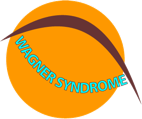glaucoma
Glaucoma is progressive damage to the optic disk accompanied by specific defects in the visual field. Jansen claimed in his thesis (1966) that 50% of the people he studied had glaucoma. But in those days an elevated intraocular pressure was seen as a symptom of glaucoma whereas today it is seen as a risk factor.
Probably as this thesis is only available in Dutch and not online, the data from this thesis on IOP and glaucomatous changes are not well assessed. Recently we evaluated the data of Jansen.
Elevated intraocular pressure in this pedigree is obvious. The average IOP was 21,32, range 11-39 mmHg, sd 4,97 mmHg, age 10-75 years. Almost everybody over 30 had an IOP > 22 mmHg. n=24 out of 33 for the total population: with children younger than 10 and people with minor symptoms the IOP was not measured.
In some other pedigrees there is also the issue of elevated IOP and/or glaucoma. But also in this families it is not clear how they qualified glaucoma. In other families dysgenesis of the anterior chamber angle is mentioned, which can cause a diminished outflow of aqueous humour and thus an elevated IOP.
And at last: vitreoretinal surgery can cause elevated IOP and/or glaucoma. In Wagner families this kind of surgery is not rare, so this can be the cause of an elevated IOP too. See the article from Bill Aylward (Moorfields) that says that this will happen in 20-30% of the cases.
We would like to establish if or not there is a connection between Wagner syndrome and glaucoma as it can be essential for choosing the right therapy.
So we like to ask doctors if they would fill in this form and send it to their colleague Mauk Tilanus in Nijmegen (email address in the form).
Or patients can download the form and take it to their ophthalmologist, ask him/her if s/he wants to fill it in and send or email it to the address mentioned in the form.
You can find here a form to fill in (VA / IOP / CCT / glaucoma features) in English and Dutch, and a chart with the angle damage likelihood scale, developed by George Spaeth (Wills Eye Hospital).
online research
page last modified July 22nd 2009

english
nederlands
Q & A
newsletter
links
Wagner syndrome
adls


